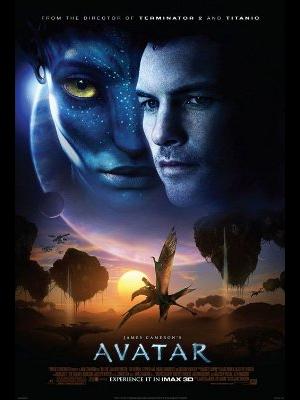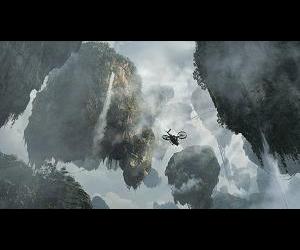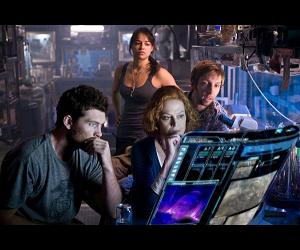Movie Review: Avatar
 | | Avatar |
James Cameron has finally returned with the release of his excruciatingly long-gestating Avatar. While not the best film Cameron has ever made, it is probably the most emblematic of his style. On one hand, it is an amazing spectacle that will leave audiences breathless, but on the other hand, it is an incredibly cliché story with weak, one-dimensional characters. Ultimately, it's ironic that something so groundbreaking is, at the same time, completely unoriginal.
Visually, Avatar is unlike anything you've ever seen. Cameron has done such a remarkable job melding photorealistic CG with live action that the two are nearly indistinguishable. Ambitious and masterful don't even begin to describe what has been done here, from a technical standpoint. It is as if the movie has come to 2009 from ten years in the future, with all the benefits of visual effects technology that has yet to be invented. Indeed, it will likely be a year or two before we see another movie that even attempts this level of filmmaking.
It's been said plenty of times, but it bears repeating: James Cameron has raised the bar once again. When it comes to visual and special effects, the man is simply unmatchable, and for this reason alone, Avatar deserves some respect. This is why--before I get into my many complaints about the film--any movie enthusiast should see this movie in the theater; waiting for the DVD will not cut it. See it in 3-D if you want, though honestly I find the gimmick too distracting, not to mention how it makes some of the digital matte paintings too obvious.
If the visual effects are the only things about Avatar that interest you and you have no expectations in terms of story, feel free to stop reading this review now. Seriously, if you just want to be entertained by pretty pictures, this may be the best movie you will see in a long time.
 | | There is no way the small screen could do this justice |
However, for every gasp of awe that comes from the images on the screen, there is a deep sigh of disappointment from almost everything else. While few of Cameron's previous narratives would be classified as wholly original, the story of Avatar is more painfully amateurish and derivative than any of his previous works. It sometimes feels like he wasn't even trying.
The plot involves a soldier being sent to infiltrate a primitive culture, learn their ways, and betray them so that the military can come in, kill everybody, and steal natural resources. The soldier, of course, falls in love with the culture and one of the women, and therefore helps the natives fight off the invasion. It's been described as Dances with Wolves meets Ferngully: the Last Rainforest, and unfortunately, that is a fairly accurate description.
In Avatar, the natives are unimaginatively named the Na'vi, and the resource is called--I wish I were making this up--unobtainium, though what makes the stuff so damn valuable is never explained. Instead of coming up with a unique and interesting alien culture, Cameron makes the Na'vi so similar to native Americans (the Hopi, specifically) that you almost feel insulted by the stereotypes. One character even refers to them as "savages."
This could all be overlooked if the characters were at least interesting and dynamic. Alas, they are not. Every single character is cut and pasted from at least a dozen other works and given the kind of dialogue a twelve-year-old would write. There's the corporate executive who, when he's not practicing his putting, is only interested in the financial bottom line--played by Giovanni Ribisi recreating his character from Boiler Room--and there's the evil military leader with the scarred face who sips from his coffee cup while he orders genocide. There's the misunderstood scientist who feels threatened by the military-industrial complex--played by Sigourney Weaver recreating her character from Gorillas in the Mist--and there's the native girl who is one with the planet and who falls in love with the protagonist for no reason whatsoever. There's the head warrior who doesn't respect the protagonist until he proves himself in battle, and there's the plucky sidekick who strolls onscreen once in awhile to deliver one or two sad attempts at humor. And then there's the protagonist, Jake Sully, a blank slate of a character whose incessant narration is pointless and annoying and whose predictable change halfway through the story is about as emotionally compelling as a haircut.
 | | "Stop acting so much!" |
None of this is the fault of the cast. Sam Worthington, Zoe Saldana, Sigourney Weaver, and Giovanni Ribisi appear to be trying to do something interesting with these weakly-developed archetypes, and every once in a while, they pull off a beat or two of a really interesting performance that manages to sneak past the editor. Even Michelle Rodriguez is trying to do something new, despite the fact that she plays the exact same character she always plays. The only exception would be Stephen Lang, who plays the cartoonishly evil Colonel Miles Quaritch with about as much effort as one would play a pirate at a Halloween party.
All of this is the most disappointing aspect of Avatar. There is potential within the premise to create something unique, provocative, original, and unpredictable, but not a single iota of that potential is met. Cameron spent so much time creating the alien world of Pandora and the effects technology necessary to film it that he neglected to come up with a story to match. It's just terrible storytelling that borders on insulting, and I have a hard time understanding why Cameron sat on this film for nearly a decade without spending more than a few hours on the actual script.
However, I will give Cameron credit when it comes to certain details behind the story. Most of the creatures of Pandora (with the unforgivable exception of the Na'vi themselves) share certain unusual characteristics that indicate a unique evolutionary path. They have nostrils at the base of their necks, or a similar wing structure, or six limbs. While the creatures themselves aren't all that imaginative (you essentially wind up with an alien horse, an alien giant bird, an alien hyena, an alien hippo, etc.), they have a design that is extremely well thought-out. And the one possible note of originality is how all life on this planet is literally connected by psychedelic fibers that protrude from various appendages. Still, the revelation that all these connections **SPOILER!** create a hive mind and an "Earth mother" are not exactly new concepts in science-fiction.
 | | The tech is pretty cool |
Similarly, the technological details are fully extrapolated, from 3-D computer readouts to massive exoskeletons that make Ripley's look like a Pepsi can. Still, with all that technology comes a few inevitable plot holes. For example, if Ribisi's company was hell-bent on removing the Na'vi by any means necessary and had access to mercenaries with ridiculously large quantities of military equipment, why not just bomb the Na'vi from orbit? And why, when it is made clear earlier in the film that Na'vi arrows can't pierce the glass of the military airships, do the arrows conveniently fly through the same windshields during the climax of the movie? And why were they bothering to fund and/or humor the scientists whose reasons for being there are clearly at odds with the company's?
As for the central gimmick of the film--the avatars themselves--it is never explored in any interesting way. Cameron does play with the idea thematically, but he probably would have done better to spend more time on the psychological and physical effects of the procedure. You see Sully wearing down slightly and voicing some concerns that he is losing touch with reality, but you never see that play out in any other way, nor do you see the same effect on the other people who inhabit avatars. Since Cameron chooses not to spend much time on his central concept, it never gets beyond the gimmick. Since the gimmick itself isn't original--you only need to go back a few months to find it at least twice, in the movies Gamer and Surrogates--it doesn't drive the story anywhere new.
But if you can ignore the awful storytelling, the one-dimensional characters, and the unimaginative clichés, at least there is a good movie underneath. James Horner's score is beautiful, the editing and pacing are good, the action is intense (if hard to feel very invested in), and did I mention the effects are ball-shatteringly awesome?
FINAL SCORE:





While Avatar is definitely a remarkable achievement and a visual experience unlike anything you've ever seen, it's impossible to forgive the incredibly lazy storytelling.
|
-e. magill 12/22/2009
|
|